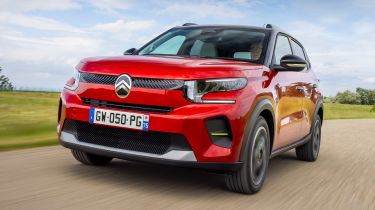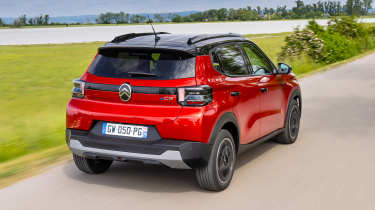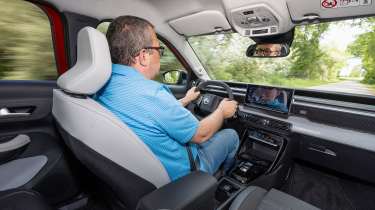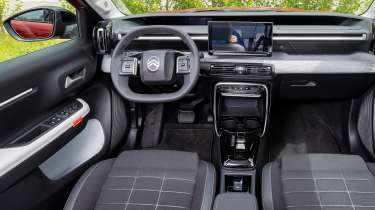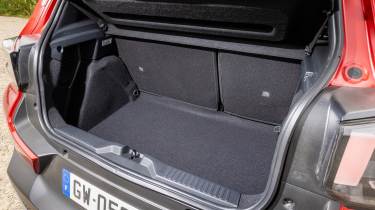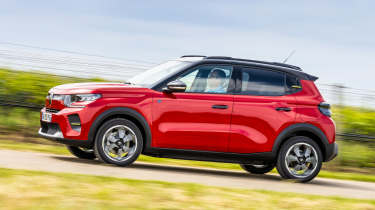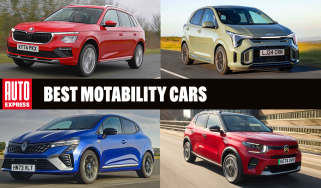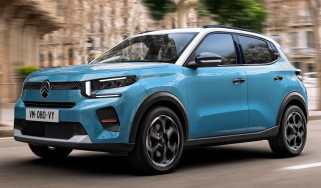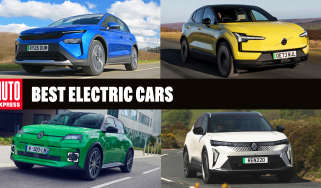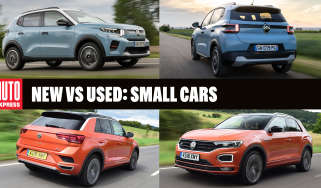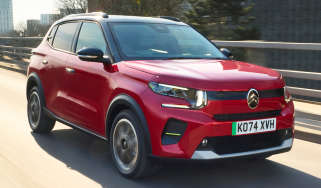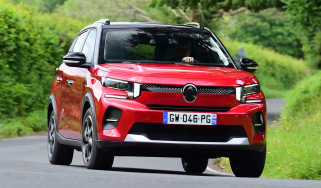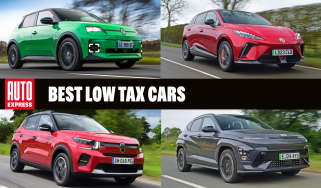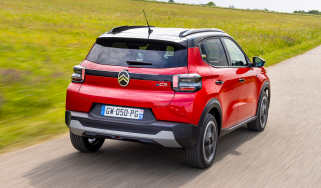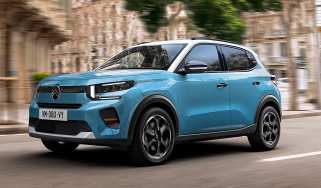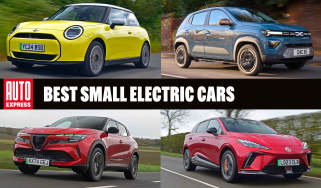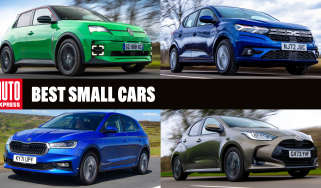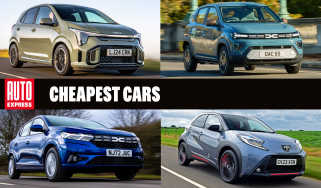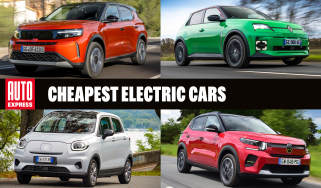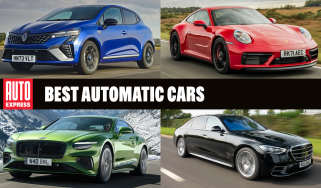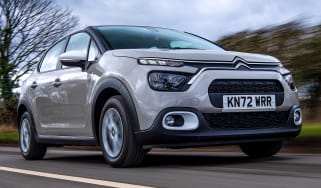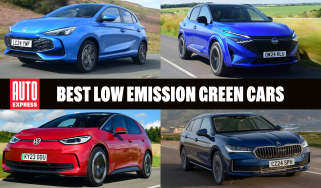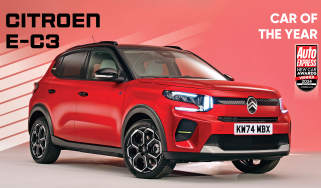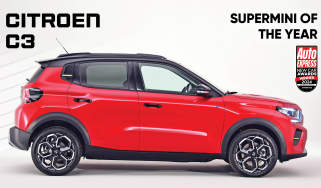Citroen C3 review
A clever rethink of the small, affordable car theme, the C3 and its all-electric e-C3 twin have the potential to really shake up the market

Quick verdict
At first glance, the Citroen C3 is a pretty unremarkable small car – more comfortable, admittedly, than most of its peers, but not blessed with any dynamic sparkle or, in its electric form, a big battery. However, its cabin is spacious for its size, and it comes with a decent line-up of standard kit. Prices are expected to be keen, potentially making the C3 a strong petrol supermini in a dwindling market, and the e-C3 a usable small electric car with the sort of monthly PCP deals that could open up the transition to electric to lots of new customers. We await detailed prices and finance rates with interest.
| Key specs | |
| Fuel type | Electric or petrol |
| Body style | Five-door hatchback |
| Powertrain | 44.0kWh battery (net), 1x e-motor or 1.2-litre petrol |
| Safety | N/A |
| Warranty | 3-year/unlimited mileage |
Citroen C3: prices, specs and rivals
Citroen stands for comfort, but there’s also a push within its parent Stellantis Group for the classic French brand to also score big on value – to the point, in fact, where it can be considered at least an indirect rival for thrift king Dacia. That broadening of mission statement really hits home here with the all-new Citroen C3 destined to rewrite a few rules on supermini pricing, particularly with its all-electric ë-C3 version.
Of course, Dacia itself is already doing that with its forthcoming Spring EV – yours from a sniff under £15,000. And MG is pushing the boundaries with its MG3. But while those models are a jacked-up city car and a hybrid-only supermini respectively, Citroen’s C3 and ë-C3 are genuine supermini-sized creations, complete with either a regular petrol powertrain or a zero-emissions set-up. And their prices should start from less than £18,000 (petrol) and £22,000 (EV), putting the petrol model squarely into the value market and, in the case of the e-C3, potentially redefining what you can expect to pay for a small car that runs purely on electricity. Stellantis stablemates like the Peugeot E-208 and Vauxhall Corsa Electric could look even more expensive than they do already, and even BYD’s Dolphin might suddenly appear pricey.
Used - available now
Beneath the C3 and e-C3 sits Stellantis’s new STLA Smart Car platform – a version of the CMP architecture that has underpinned the likes of the 208 and Corsa, but simplified a little to make it even cheaper to produce.
The new Citroen C3 is a very different-looking creation from its predecessor. It’s just a couple of centimetres longer overall, and half a centimetre wider, so it’s very much still a four-metre vehicle. But it sits a full 10cm taller, a reflection of a design approach that definitely melds supermini with SUV. This shift in direction, of course, is what allows the C3 Aircross to become bigger, chunkier and even more practical for its forthcoming new generation – complete with seven-seat practicality.
The new look does include a few elements pinched from the distinctive Citroen Oli concept car – most notably a new vertical grille, on which is proudly displayed the latest iteration of Citroen’s corporate logo. The chunky look and jacked-up stance mean that larger wheels – including 18-inch items – can still be wrapped with sensibly profiled rubber, a potentially key factor when you’re trying to ensure best-in-class comfort.
UK customers will be offered a choice of three trim levels. Even the entry-level You! versions come with cruise control, air conditioning, rear parking sensors and LED headlights – although they do feature a ‘smartphone station’ instead of the central display, so you’ll be expected to use your own device for in-car entertainment and navigation.
Plus brings 17-inch wheels, a two-tone paint job with a contrast roof (black or white), the 10.25-inch touchscreen infotainment system, a 60/40-split folding rear seat, Citroen Advanced Comfort seats, and powered and heated side mirrors.
The range-topping Max version, like the cars tested here, has LED tail-lights, rear privacy glass, climate control, a wireless smartphone charging pad and electric rear windows. Yes, the other two versions make do with manual winders – another subtle reminder that you’re in a car built to cost.
Engines, performance & drive
| Model | Power | 0-62mph | Top speed |
| Citroen e-C3 44kWh 113PS | 111bhp | 11.0s | 84mph |
| Citroen C3 1.2 PureTech | 99bhp | tbc | tbc |
| Citroen C3 1.2 PureTech Hybrid 100 | 99bhp | tbc | tbc |
The entry point of the Citroen C3 range is the 1.2-litre PureTech petrol version. Equipped with a six-speed manual gearbox, it does without any electrical assistance and has 99bhp on tap.
For those who want some zero-emissions capability, the car is also offered in Hybrid 100 form; this uses the same engine but pairs it up with a 28bhp electric motor that’s integrated into the six-speed automatic transmission.
The pure-electric e-C3 is being launched with a single set-up, complete with a 44kWh lithion iron phosphate (LFP) battery pack that’s good for an official range of 199 miles. The maximum charging speed is solid for the price, at up to 100kW – enough, Citroen claims, to get the battery from 20 to 80 per cent of capacity in 26 minutes. It’ll charge at 7.4kW from home wallboxes, but while a quicker 11kW AC set-up is available as an option, a heat pump is not; you’ll just have to take the hit on range in colder conditions.
In time there will be an even more affordable, smaller-battery edition with around 125 miles of range; it’s expected to sneak under the £18k mark – assuming that the UK division decides to sell it here (the jury’s still out on that one, apparently).
The fastest version in the real world could well be the hybrid, because having driven both, we can report that neither the regular 1.2 C3 or the e-C3 is set up to deliver earth-shattering performance. The EV’s single front-mounted motor produces 111bhp and 120Nm of torque, numbers that are outclassed by the more potent petrol version of the previous-gen car. That relatively modest battery means an overall kerb weight of less than a tonne and a half, but even so, 0-62mph takes 11 seconds (how many other EVs do you know that fail to crack the 10-second mark?) and the top speed is just 84mph. Rapid it is not.
It doesn’t feel quite as slow as its figures suggest, however. The throttle modulation is pretty gentle and linear, and that makes it easy to drive smoothly, with minimal ‘EV lurch’. And sure enough, the suspension initially feels very soft as you drive slowly around town; the mix of MacPherson struts up front and a simple twist beam at the rear, and those hydraulic bump stops, does a good job of smoothing out manhole covers and the crests and falls over speed bumps.
The manual petrol, meanwhile, fires up with a fairly gruff note and as you accelerate, you’re unlikely to be fooled into thinking you’ve anything other than a three-cylinder engine beneath the bonnet. But there’s a decent amount of low-down torque for what is a pretty light car (without the EV’s battery pack), so you can ride the taller gears and keep the revs low. the experience of shifting up or down isn’t exactly helped by a preposterously large and awkwardly shaped gearknob, and a typical, slightly baggy Stellantis shift. But the rest of the control weights are consistent enough, so it’s certainly possible to drive the ICE C3 smoothly.
Regardless of powertrain, as the speed rises, the car copes best with gentle undulations, occasionally taking a second stab to settle but feeling like it’s generally wafting along quite nicely as a result. What the cushions can’t do so well is cope with aggressive, sharp inputs and/or higher-frequency imperfections. In truth the C3 probably doesn’t feel worse than many other superminis at this, but it’ll be interesting to see if its specific set-up is exposed more cruelly on the UK’s crumbling road surfaces.
Predictably, the C3 isn’t really up for much driver involvement. The steering is pretty quick but light and lifeless, and if you really commit to a corner the car will just wash out into understeer, generally before body roll gets the better of it.
None of these traits is likely to flag up the fact that the C3 and e-C3 are value-driven offerings; indeed, the low-speed ride quality might suggest otherwise. But when you’re up and running, you’ll notice one giveaway: refinement. The petrol engine’s gruff note never quite fades away completely, and even the electric motor has a flutey whine that isn’t completely dialled out by sound deadening. There’s a fair bit of wind noise once you’re above 40mph, too, and it’s matched by tyre roar at motorway speeds that could become a little wearing.
MPG, range, charging & running costs
| Model | Battery size | Range | Insurance group |
| Citroen e-C3 44kWh 113PS | 44.0kWh (net) | 199 miles | NA |
| Model | MPG | CO2 | Insurance group |
| Citroen C3 1.2 PureTech | tbc | tbc | NA |
| Citroen C3 1.2 PureTech Hybrid 100 | tbc | tbc | NA |
The Citroen e-C3’s 44kWh battery is rated for 199 miles of range. Our drive across a mix of fast country B-roads and slow Austrian suburban streets, interspersed with short squirts of acceleration for photography, yielded a projected range of 174 miles. This figure ought to be beatable with more conventional use, we’d argue, although the lack of a heat pump (it’s not available even as an option) means you could easily wipe 10 per cent back off the total range when conditions cool.
The EV’s charging port is on the rear of the car, where you’ll find the petrol filler flap on conventionally powered versions. This is still a compact car, though, so if you choose to park with the e-C3’s nose closer to the charging port, you shouldn’t have any problems running a regular-length cable along the side to reach the socket.
We don’t have official efficiency figures for the regular petrol C3 or the hybrid version just yet. However, the PureTech motor is a well-calibrated unit, and the relatively light weight of the ICE editions should deliver solid real-world economy.
Design, interior & technology
The C3’s front-cabin finish is neat, without ever feeling plush. The fascia features a lightly padded bit of fabric that helps to lift the ambience a little, but the rest of your surroundings are hard plastics – including slab-slided doors that feature what has to be the world’s loneliest strip of chrome-effect trim.
Stellantis’s trademark piano-black finish is used sparingly, thank goodness, although its position around the bottom of the centre console will place this easily scratched material right where hands are likely to fumble for phones, keys and coins.
The steering wheel is a curious small, almost-oblong creation – Citroen’s take, in effect, on the Peugeot i-Cockpit. But as you pull away, you’ll find the head-up display (which isn’t really a HUD at all, but rather just a simple, slim instrument panel) easier to see over the top of the wheel than the dials in pretty much any Peugeot.
It’s a shame, though, that the slim panel just shows speed, battery charge level and energy consumption, with no extra info available, like navigation instructions.
Sat-nav, stereo and infotainment
Basic versions of the C3 and e-C3 get the plumbing for infotainment – wiring and speakers – without the actual central display. Instead they come with a mount designed to hold your smarthone. Citroen offers an app that can access vehicle data, much like Dacia offers with its entry-level editions, so your experience should still be better than just running raw apps in iOS or Android.
The mid-spec and top-spec versions switch to a 10.25-inch central system, which dominates the fascia but is positioned low enough that you never feel you have to peer over the top of it. The interface is simple and clean, with reasonably large buttons for key functions; on the whole, the set-up is better to use than the glorified Android tablets that feature in many of the Citroen ë-C3’s likely Chinese rivals. In a victory for usability, it’s worth remembering that this piece of tech only has to worry about entertainment and navigation, because Citroen has kept physical switches beneath it for heating and ventilation control.
Boot space, comfort & practicality
| Dimensions | |
| Length | 4,015mm |
| Width | 1,755mm |
| Height | 1,577mm |
| Number of seats | 5 |
| Boot space | 310 litres |
The cabin is big enough for four six-footers; those in the rear seats might complain a little about footroom, but there’s tons of headroom. The battery is stored beneath the back seat, too, so the floor remains a sensible height; as a result, you don’t end up pinched in the back seats, with your bottom down low and your knees up high.
The boot, meanwhile, has a deep floor – so assuming you’re okay with hoiking heavy items over the hefty lip, you’ll find 310 litres of capacity; that’s only just north of the Dacia Spring’s 308-litre load bay, admittedly, but significantly bigger than other full five-seaters like the Vauxhall Corsa.
It’s desperately bare back there, though, with a single preformed plastic hook the only thing approaching a ‘clever storage solution’. It really feels like you’re just being given a decent-sized hole and told to make the best of it.
Safety & reliability
| Key standard safety features | Euro NCAP safety ratings |
|
|
The Citroen C3 and e-C3 haven’t been tested by Euro NCAP yet – so don’t be fooled if you search online and find results for the Indian-spec C3. However, it’s worth noting that the STLA Smart Car platform has been built to a cost, so a full-five star result may not be forthcoming. Citroen has fitted the car with plenty of active safety kit, though, including active safety brake, lane-departure warning, driver-attention alert and traffic-sign recognition.
Citroen’s reputation for reliability hasn’t been sensational over the years but the brand has improved greatly in recent times. This culminated in an outright victory for its C4 and e-C4 in our Driver Power ownership-satisfaction survey, complete with an endorsement for reliability.
Should you buy a Citroen C3 or e-C3?
The C3 and e-C3 are value-driven offerings in a market where prices have continued to creep up in recent years. They have few luxuries, but if you’re in the market for a compact yet practical small car, powered by either petrol or electricity, then they certainly merit consideration. The fact that they deliver a slice of Citroen’s famous comfort, particularly around town, is a bonus.
Frequently Asked Questions
Citroen offers a fairly standard 3-year, unlimited mileage warranty on the C3.

